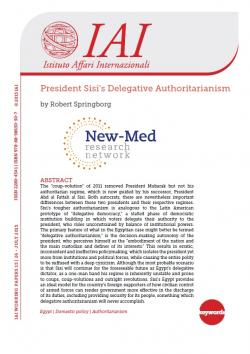President Sisi's Delegative Authoritarianism
The “coup-volution” of 2011 removed President Mubarak but not his authoritarian regime, which is now guided by his successor, President Abd al Fattah al Sisi. Both autocrats, there are nevertheless important differences between these two presidents and their respective regimes. Sisi’s tougher authoritarianism is analogous to the Latin American prototype of “delegative democracy,” a stalled phase of democratic institution building in which voters delegate their authority to the president, who rules unconstrained by balance of institutional powers. The primary feature of what in the Egyptian case might better be termed “delegative authoritarianism,” is the decision-making autonomy of the president, who perceives himself as the “embodiment of the nation and the main custodian and definer of its interests.” This results in erratic, inconsistent and ineffective policymaking, which isolates the president yet more from institutions and political forces, while causing the entire polity to be suffused with a deep cynicism. Although the most probable scenario is that Sisi will continue for the foreseeable future as Egypt’s delegative dictator, as a one-man band his regime is inherently unstable and prone to coups, coup-volutions and outright revolutions. Sisi’s Egypt provides an ideal model for the country’s foreign supporters of how civilian control of armed forces can render government more effective in the discharge of its duties, including providing security for its people, something which delegative authoritarianism will never accomplish.
Paper produced within the framework of the New-Med Research Network, July 2015. See also Caudillismo along the Nile, in The International Spectator, Vol. 51, No. 1 (March 2016), p. 74-85.
-
Details
Roma, IAI, July 2015, 15 p. -
Issue
15|26 -
ISBN/ISSN/DOI:
978-88-98650-50-7
Introduction
1. Delegative democracy/authoritarianism
2. Sisi’s prescriptions
3. Regime dynamics
4. The future of Sisi’s delegative system
5. What is to be done?
Topic
Tag
Related content
-
Publication27/04/2016
Caudillismo along the Nile
leggi tutto -
Ricerca09/10/2014
New-Med Research Network: The Future of Cooperation in the Mediterranean
leggi tutto



